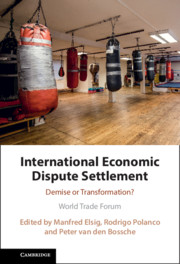Book contents
- International Economic Dispute Settlement
- International Economic Dispute Settlement
- Copyright page
- Contents
- Figures
- Tables
- Contributors
- Preface
- Abbreviations
- 1 Introduction
- 2 Contracting v. Multilateralism in Global Economic Governance
- Part I Current Challenges in International Trade Dispute Settlement
- Part II Current Challenges in International Investment Dispute Settlement
- Part III New Issue Areas and Dispute Settlement
- Part IV Regional Approaches for International Economic Dispute Settlement
- 14 The Future of International Economic Dispute Resolution – An Asian Perspective
- 15 No Lessons from the Crises in the International Trade and Investment Dispute Settlement Mechanisms: The African Continental Free Trade Area
- 16 The Time of PTA Dispute Settlement Mechanisms Might Have Come: Assessing the Risks
- 17 Dispute Settlement in Free Trade Agreements as a Suggested Alternative to WTO Dispute Settlement
- Index
- References
14 - The Future of International Economic Dispute Resolution – An Asian Perspective
from Part IV - Regional Approaches for International Economic Dispute Settlement
Published online by Cambridge University Press: 07 August 2021
- International Economic Dispute Settlement
- International Economic Dispute Settlement
- Copyright page
- Contents
- Figures
- Tables
- Contributors
- Preface
- Abbreviations
- 1 Introduction
- 2 Contracting v. Multilateralism in Global Economic Governance
- Part I Current Challenges in International Trade Dispute Settlement
- Part II Current Challenges in International Investment Dispute Settlement
- Part III New Issue Areas and Dispute Settlement
- Part IV Regional Approaches for International Economic Dispute Settlement
- 14 The Future of International Economic Dispute Resolution – An Asian Perspective
- 15 No Lessons from the Crises in the International Trade and Investment Dispute Settlement Mechanisms: The African Continental Free Trade Area
- 16 The Time of PTA Dispute Settlement Mechanisms Might Have Come: Assessing the Risks
- 17 Dispute Settlement in Free Trade Agreements as a Suggested Alternative to WTO Dispute Settlement
- Index
- References
Summary
The international economic law landscape has witnessed a number of significant developments in recent years, with some being gradual while others have been more in the nature of jolts. Among the former are the rise in bilateral and regional trade agreements and their concomitant dispute settlement mechanisms, and an increase in the number of investor–state disputes. Among the latter (‘jolts’) are the US administration’s decisive stance in 2018–19 regarding the WTO’s dispute settlement system – particularly the Appellate Body membership, renewal processes and decision-making – and the rapid increase in reform activities of investor–state arbitration institutions and working groups. Another development has been the so-called US–China ‘trade war’, led by the imposition of tariffs, and the potential role of the security exception in disputes pending at the WTO in relation to such impositions.
- Type
- Chapter
- Information
- International Economic Dispute SettlementDemise or Transformation?, pp. 373 - 405Publisher: Cambridge University PressPrint publication year: 2021



